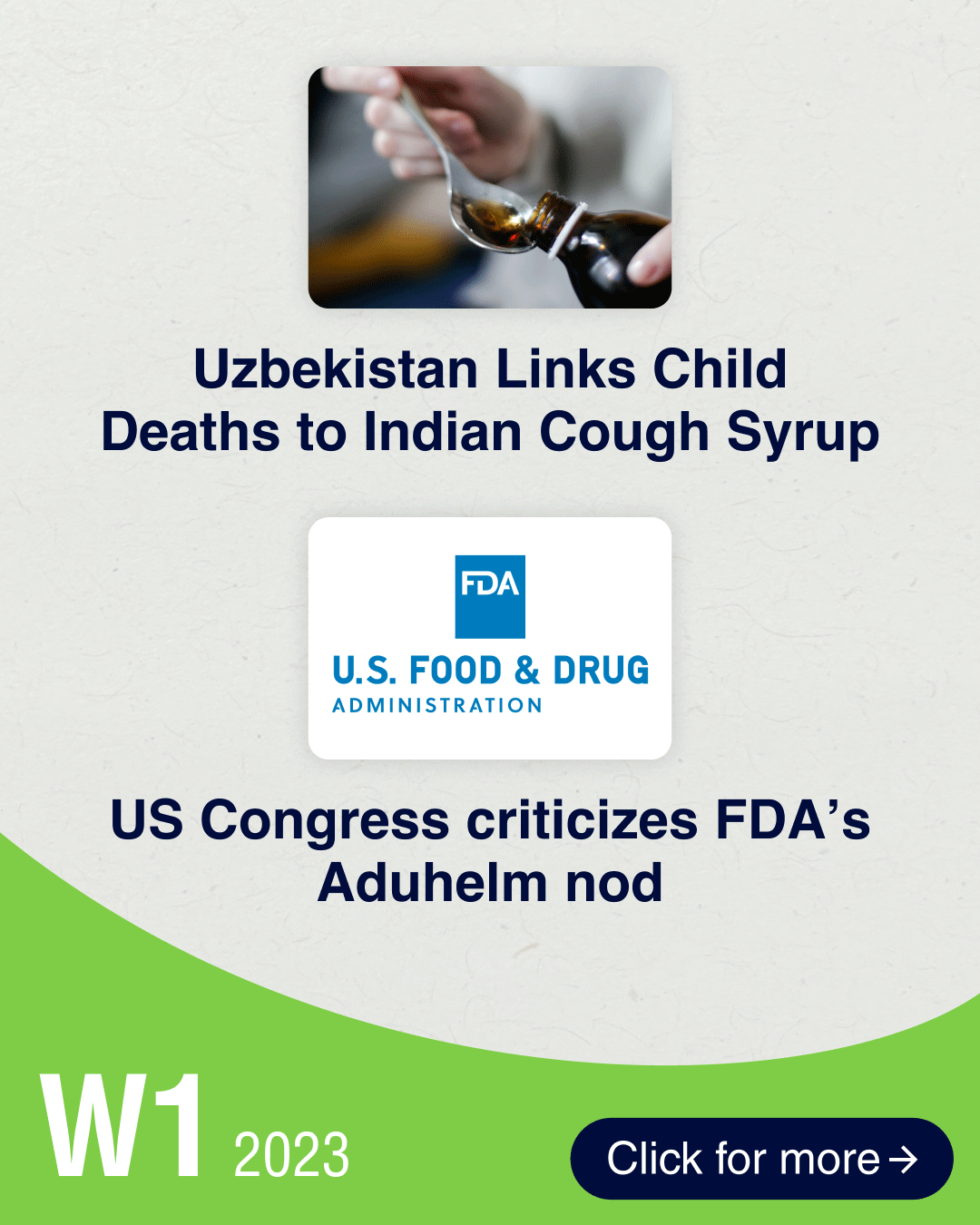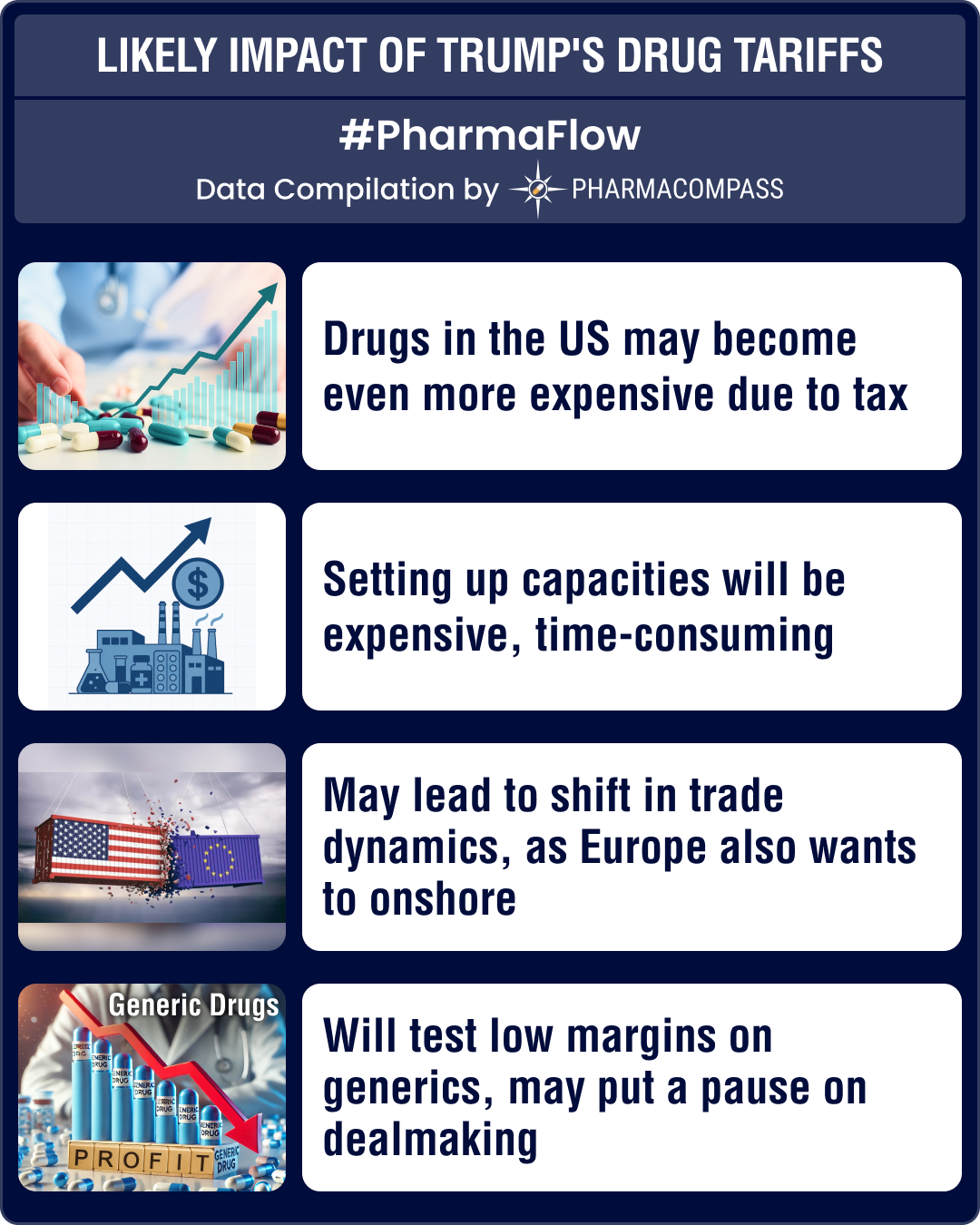
By PharmaCompass
2023-01-05
Impressions: 2,292 (Article) || 1 (Video)
In what appears to be a repeat of the recent mishap in The Gambia, a contaminated cough syrup manufactured by Indian drugmaker Marion Biotech has been linked to 19 child deaths in Uzbekistan.
In the US, an investigation by two House of Representatives committees has found that the US Food and Drug Administration’s accelerated approval of Biogen’s Alzheimer’s drug — Aduhelm — was “rife with irregularities.”
In approvals, the FDA has approved TG Therapeutics’ monoclonal antibody – Briumvi (ublituximab) – for treating patients with relapsing forms of multiple sclerosis. The agency has also approved Roche and Genentech’s Lunsumio (mosunetuzumab) as a third-line therapy for follicular lymphoma.
In deals, both Merck and Eli Lilly have extended their partnerships with Japanese partner, PeptiDream. And Gilead has signed a licensing deal worth up to US$ 658.5 million with EVOQ Therapeutics for rheumatoid arthritis and lupus.
After Gambia, Uzbekistan links child deaths to cough syrup from Indian drugmaker
In October last year, the World Health Organization (WHO) had said contaminated cough and cold syrups manufactured by Indian drugmaker Maiden Pharmaceuticals may have caused the deaths of 70 children from acute kidney injuries in The Gambia. Now, a second Indian drugmaker — Marion Biotech — has got implicated in a similar mishap in Uzbekistan as it was allegedly selling a contaminated cough syrup that might have caused the deaths of 19 children.
A statement issued by the Uzbek government said the children who were suffering from an acute respiratory disease died due to kidney failure after consuming the Dok-1 Max syrup manufactured by Marion. The affected children were administered the syrup as an anti-cold remedy in doses higher than the standard dose for children. The ministry said preliminary laboratory tests of the syrup have found the toxic substance to be ethylene glycol.
While Uzbekistan has withdrawn the Dok-1 Max tablets and syrups and has suspended sales of all Marion medicines, India has suspended production at the company’s manufacturing facility near Delhi after a joint inspection by the apex drug regulator and state drug controllers found “deviations” from good manufacturing practices. Samples have been sent for testing.
US Congress report says FDA’s approval of Aduhelm was “rife with irregularities”
The controversy surrounding FDA’s accelerated approval of Biogen’s Alzheimer’s drug — Aduhelm — is back in news. An 18-month-long investigation conducted by two House of Representatives committees has found that the approval process was “rife with irregularities,” with the FDA failing to adhere to its own guidance and internal practices.
The investigation report comes at a time when the FDA is evaluating two other Alzheimer’s drugs for approval, including one by Biogen and Eisai (lecanemab) whose PDUFA date is January 6. The FDA had granted an accelerated approval to Aduhelm in June 2021 despite experts claiming that there was not enough evidence to show that the drug was effective.
The report drew attention to FDA and Biogen’s unusually high number of phone calls, meetings and emails, and the agency’s failure to record some of them. It questioned FDA’s abrupt course change to grant accelerated approval to Aduhelm on a “significantly abbreviated timeline”.
The report also criticized Biogen for setting an “unjustifiably high” price for the medication at US$ 56,000 per year. It claimed that the drugmaker’s own estimates showed that it had anticipated Aduhelm to be a financial burden on Medicare.
Pfizer’s gene therapy for hemophilia B succeeds in late-stage trial
Pfizer’s experimental gene therapy for the treatment of hemophilia B has met its main goal in a late-stage study. Hemophilia B is a rare blood disorder that is caused by missing or low levels of a protein called factor IX that helps the body effectively clot blood.
Data from the phase 3 trial showed that a single dose of the therapy, fidanacogene elaparvovec, led to a 71 percent reduction in the annualized bleeding rate in patients with moderately severe to severe forms of the disorder.
The drugmaker had licensed the therapy from Spark Therapeutics in 2014. If the FDA approves the treatment, it will compete with the first-ever gene therapy for the disease – i.e., Australian drugmaker CSL’s US$ 3.5 million gene therapy, Hemgenix, which was approved in November last year.
FDA approves TG Therapeutics’ MS drug, Roche’s follicular lymphoma med
The FDA has approved TG Therapeutics’ monoclonal antibody – Briumvi (ublituximab) – for treating patients with relapsing forms of multiple sclerosis.
The approval for Briumvi is based on data from two late-stage trials. It is the first and only anti-CD20 monoclonal antibody approved for the condition. The New York-based biotech plans to launch the drug in the first quarter of 2023. Briumvi will compete with Roche’s Ocrevus and Novartis’ Kesimpta.
The agency has also approved Roche and Genentech’s Lunsumio (mosunetuzumab) as a third-line therapy for treating a type of rare cancer called follicular lymphoma. It is the first bispecific antibody approved by the FDA that targets CD3 and CD20 proteins.
The drug will cost around US$ 180,000 for a fixed course of eight cycles of treatment. It will compete against Novartis’ Kymriah, Bristol Myers Squibb’s Breyanzi and Gilead Sciences’ Yescarta.
Merck, Lilly expand their tie-ups with PeptiDream; Gilead teams up with EVOQ
Merck has extended its collaboration with its seven-year-old Japanese partner, PeptiDream. The duo has signed a potential US$ 2.1 billion deal to discover and develop peptide drug conjugates.
The Japanese firm will receive an upfront payment and will be eligible for milestone payments along with royalties. Under the deal, PeptiDream will provide peptide candidates identified from its proprietary Peptide Discovery Platform System (PDPS) technology.
Lilly, which has also partnered with PeptiDream since 2013, has inked a new deal, tasking the latter to identify high-affinity macrocyclic peptide ligands to its targets of interest. PeptiDream will receive an upfront payment and could receive more than US$ 1.2 billion in milestones from the Lilly deal.
In other deals, Lilly has teamed up with California-based Capsida Biotherapeutics to access the latter’s AAV engineering platform to develop intravenous gene therapies for central nervous system diseases. Lilly will pay US$ 55 million upfront in cash and has promised up to US$ 685 million in milestone payments, plus royalties. And, Gilead has signed a licensing deal worth up to US$ 658.5 million with EVOQ Therapeutics to work on preclinical development for rheumatoid arthritis and lupus.
The PharmaCompass Newsletter – Sign Up, Stay Ahead
Feedback, help us to improve. Click here
Image Credit : Phisper Infographic by SCORR MARKETING & PharmaCompass license under CC BY 2.0
“ The article is based on the information available in public and which the author believes to be true. The author is not disseminating any information, which the author believes or knows, is confidential or in conflict with the privacy of any person. The views expressed or information supplied through this article is mere opinion and observation of the author. The author does not intend to defame, insult or, cause loss or damage to anyone, in any manner, through this article.”








